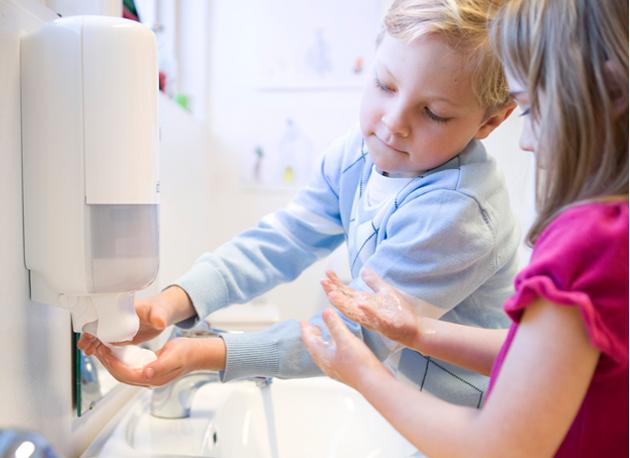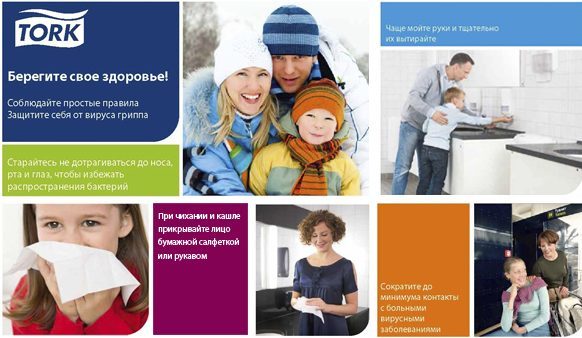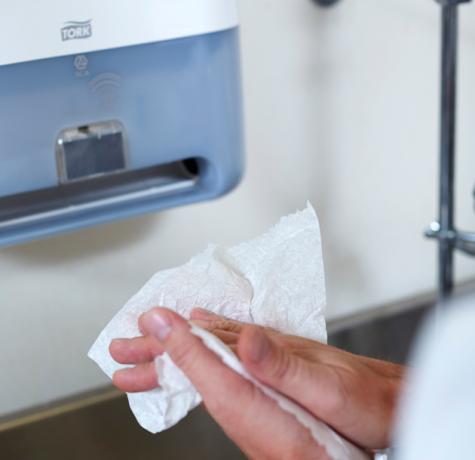Myths and facts about health in Russia
Health / / December 19, 2019
Svenska Cellulosa Aktiebolaget (SCA) - this is one of the leading international companies engaged in the manufacture of hygiene products for adults and children.
The company was founded in 1929, it is home to Sweden, headquartered in Stockholm. Sales are carried out in 100 countries of the world. You've probably seen the stores products brands Zewa, Libero, TENA, Libresse, and in public places met Tork paper products.
An important activity of SCA - education on hygiene. Poor hygiene can cause serious diseases. According to the World Health Organization, the sanitary situation in the world can be greatly improved if you just wash their hands regularly. Hand washing significantly reduces the risk of respiratory diseases and food poisoning.
But despite the importance of compliance with sanitary norms, many issues related to hygiene, are still taboo. People easily released vulgar jokes, but the word "incontinence" or "menstruation" lead us into a stupor and forced to blush.
Since 2014 SCA together with the World Council for Water Supply and Sanitation Collaborative Council (WSSCC) promotes purity: organizes seminars, publishes brochures and so on. This year, SCA and WSSCC decided to find out what people know about hygiene.
The survey covered 12 countries: United States, Mexico, Great Britain, Sweden, the Netherlands, France, Germany, China, Spain, Italy, India and Russia. The survey, conducted with the support of United Minds international consulting company, attended by 12 000 people (a thousand from each country). In Russia, 53% - women, 47% - men. They were both students and working people and pensioners.
The results of the study allowed SCA to dispel some myths about hygiene.
Myth 1. "I wash my hands often enough"
According to the survey, men in Russia wash their hands an average of eight times a day, women - ten. Not bad when you consider that the Italians and the Dutch, for example, are suitable for the shell only six and the Spaniard - eight times a day.
88% of Russians believe that washing their hands often enough. But imagine how many times a day you grab the door handle, hold the handrails on the subway, gets the money or just say hello. 66% of respondents think that other people wash their hands often enough.

Many Koreans do not see the connection between washing hands and diseases. One obvious example: last year I was resting in Sochi. When we settled in the resort, I was approached by a couple of kindness and decided to warn range infection, all children and adults suffer from terrible "intestinal flu", but this does not tell tourists not to scare away vacationers. So it is better to stock up antibiotics and drink them for prevention. Terrible infection to us stuck, although no medication, I did not buy. And all because in the dining room were always long queues to the dishes with the food, but no one turns to the washstand. Wash their hands before eating one, one and the same person, and had dinner with all dirty.
Anastasia Pivovarova
A paradox: we believe in their cleanliness, but do not trust others. Of course, it is not necessary to bring the desire to clean up filth-dread. But is it not a reason to wash your hands after using the toilet and before each meal?

Myth 2. "Health - a private matter"
If the court stood the Middle Ages, when some washed a couple of times in life, or people were isolated from each other, each would himself could decide how and to what extent to keep clean. But we live in a society, and personal hygiene is an important factor in communication.
We do not want to be next to a man, if from it smells bad. We will not kiss with those who have bad breath. We are contemptuous of people in dirty clothes. Opposite is also true: we feel insecure, if not brought myself up.

As you can see, the majority of respondents are uncomfortable with social contacts, if not washed his head or brush your teeth.
It's funny that most of all, Russians are worried about their appearance and hygiene, when they go out on a date. 62% of respondents believe that, going to a rendezvous, to be superopryatnym. In Germany, we agree with this, only 28% of respondents in the UK - 26%.

First. It is very sad when people launch themselves to such an extent that it actually starts to interfere with the lives of others. And, suddenly, it's not just about unpleasant smells and hygiene of the crash. More sad that such Plyushkin handle extremely difficult in our country, but in fact - is virtually impossible.
Second. Although we do not live in the Middle Ages, it is a feeling that many do not understand the concept of hygiene. This is not a fashionable haircut, but scorched paint hair. It is not bleached front, but the rotten back teeth. This does not trust the sexual partner, but the belief in the myth that during menstruation can not get pregnant.
The third - the best. Most trend confuses me perk just before a date. Especially the girls. Monitor their hygiene should always be, regardless of whether you go you're on a date or not, do you have a man or not, do you have a husband or not.
Maria Verkhovtseva
But what about us think how we produce the impression is still secondary. Home health mission - to prevent the spread of bacteria and viruses. On this depends the health of the population of a given country and the survival of mankind as a species. So doctors do not recommend vain to wash their hands often during epidemics of influenza and SARS.

Employees of the company SCA, dealing with trademark Tork, especially for kindergartens developed the program "clean palms». In an accessible form of a game kids explains the rules of hand hygiene. According to doctors, this simple and useful habit, like hand washing, - the best way to prevent the spread of infectious diseases among children in the kindergarten or school.
Myth 3. "People do not have problems with the purchase of hygiene"
Today, one can easily purchase any hygienic means from paper handkerchiefs to urological diapers. Huge selection and no deficit. But people still have difficulty with the acquisition of hygiene.
"What's the problem?" - you ask. The problem in their heads.
According to the survey, men and women in Russia are uncomfortable buying products for personal hygiene. 56% are embarrassed to buy condoms, 42% - antifungal agents, 16% - toilet paper, 45% - pads or tampons.
Subject menstruation in Russia in general is forbidden. A normal physiological process, which women are most of his life, considered something shameful. Even the word itself strongly veil "critical days", "red letter day" and so on.
23% of women in Russia prefer not to use in the conversation the word "menstruation". In Germany and Spain, avoiding words, only 5% of the fair sex.
Only one out of five women interviewed in our country can safely cycle to discuss with your partner. The rest at best seek the advice of girlfriends and mothers, and at worst - just silent.
Six out of ten male respondents admitted that for them to buy his wife tampons or pads in the shop - it is something beyond. In this regard, the leaders of Russia. More to confusion only Chinese men. For comparison, in Germany and Sweden only 29% of respondents said that this situation is causing them discomfort.

I can say from my own experience: the problem with buying hygiene products does exist. A couple of times in my life I had to buy gaskets for the wife (I helped her with shopping when our child was very young). It was for me a real challenge. It seems to us somewhere on a subconscious level, laid the very separation of men (women, too, are often embarrassed to buy condoms, uh-huh) and women's pieces. I do not know how else to explain it. This is wrong, and even silly. The sooner we get rid of these prejudices, the better.
Artyom Kozoriz
There is again a paradox: personal care products are available as never before, but the people in the XXI century hesitate to everything connected with the body and physiology.
Myth 4. "In my country there are no problems with hygiene"
There is a stereotype that poor sanitation - is something about Bangladesh or Mozambique, and we, they say, nothing to worry about.
Indeed, according to SCA survey, the level of concern of the sanitary situation of the population in countries such as India and Mexico, are much higher than in Russia (65% and 48% vs. 19%). But this does not mean that the Russians feel safe.
The study found that most residents of Russia are experiencing discomfort in public restrooms and transport. And women are squeamish men.

50% of Russians do not try to use the toilets in the streets, 29% - in the gym, 15% - in restaurants, 9% - in hotels, 5% - in movie theaters. In this case, the majority of respondents in Russia and in other countries in favor of stricter sanitary norms and rules.
Myth 5. "Purity in the house - taking care women"
It's a cliché. The man - the breadwinner, the woman - the keeper of the hearth. Man throws socks, woman - collects. We miners do not have time for cleaning and washing.
It's like that. The survey showed that the desire for purity in the nature of women. 9 out of 10 ladies consider themselves tidier their partners. And it is a global trend.
But why then cleaning - a typical cause for domestic quarrels? 16% of couples in Russia regularly arguing over cleaning the house. Especially if both partners work.
Women want men to do more to help them with household chores: cleaning the bathtub and countertop, pawned clothes in stiralku, we went to the store for powder and so on.

By the way, the purchase of household chemical goods and hygiene in all families is almost entirely on women's shoulders. For example, in the US toilet paper the fair sex zatarivatsya in 60% of cases in the UK - 70% of cases in Italy - 74%, in China - 75%, while in Russia - 56%. Same with personal hygiene items and diapers. Alas, the girls, if you do not buy shampoo satellite, it will wash soap.
43% of Russians would like to see more than their husbands helped them to maintain cleanliness. But only 10% of men in Russia are concerned that their loved ones are busy around the house a lot.

If a man does not want to help with homework, let them help with the purchase and installation of equipment. Dishwasher, stiralka, multivarka and robot vacuum cleaner can work wonders. Caring for household appliances easier and more interesting, than to wash the apartment. ;)
Anastasia Pivovarova
Here are some interesting data revealed SCA study.
We offer you to supplement the statistics and conduct a mini-trial. Watch and record in a week, how many times a day do you wash your hands. After seven days, calculate an average value, you will understand whether enough attention is paid to personal hygiene.
Share the results in the comments. And let's talk about what you think you need to do to public places in our country have become clearer and we are less worried about their health?

